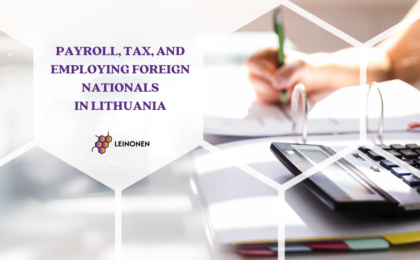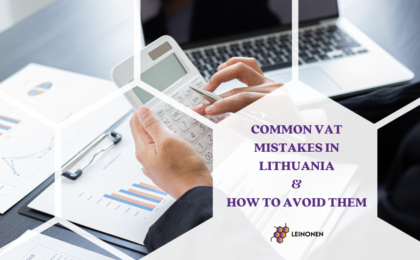Foreign companies stepping into the Lithuanian market commonly encounter certain barriers while using digital services. Especially when the representatives of the branches and subsidiaries in Lithuania are not Lithuanian citizens.
As a potential solution to this issue, the possibility to become an e-resident was implemented in Lithuania starting from the 1st of January 2021.
The purpose of e-resident status is to allow foreign citizens to access the administrative, public, or commercial services provided in the Republic of Lithuania electronically (remotely).
As Leinonen’s clients occasionally inquiries about the possibilities provided by the e-resident status, we have decided to provide a more in-depth review of e-residency and its potential benefits.
Current E-residency possibilities allows performing the following:
- Log in to the Electronic Government Gateway (English language at home page is available);
- Login to the Lithuanian Migration Information System (MIGRIS) through the Electronic Government Gateway;
- Sign documents by e-signature in the Electronic Government Gateway portal or by other means.
- Login to the State Tax Inspectorate self-service system through the Electronic Government Gateway by using e-resident’s card.
Considering the above-mentioned options, it would be safe to assume that although e-resident status simplifies some steps for foreign persons, the scope of services does not allow to use of digital services to the full extent.
According to the information provided by the Lithuanian Migration Department and representatives of the Lithuanian Register Center, the range of services provided to e-residents should be gradually expanded in the future to enable digital possibilities of developing business relations, company establishment, and management, performing financial operations as well as access to other services relevant to foreigners.
Although E-residency currently may not grant access to all electronic self-service systems and language barriers may occur in some cases as well (i.e. the self-service system of the Register Center only allows to access services like the information system of beneficiaries of legal entities (JANGIS) in Lithuanian language).
Nonetheless, the list of services provided by the Lithuanian Register Center should significantly increase over time and allow e-residents to perform the following actions:
- To register a new private liability company or branch of a foreign company;
- To submit changes to personal data and documents of a registered private limited liability company or branch of a foreign company;
- To order a paper extract of the legal entity from the register;
- To acquire a current extract of shareholders or beneficiaries;
- To order digital/paper extracts from shareholders’ and beneficiaries’ registers of a legal entity;
- To provide data on the participants (shareholders, beneficiaries) of the legal entities;
With the addition of the above-mentioned services, the e-resident status will become a more complete and appealing option for foreign persons, but the implementation time of new rights remains unknown.
The e-residency status can be obtained by completing the following steps:
Please be noted that the application for e-resident has to be submitted through a self-service system of the Lithuanian Migration Department (hereinafter – MIGRIS).
A person should fill in an application for granting the status of an electronic resident of the Republic of Lithuania through the Lithuanian Migration Information System (MIGRIS) and submit it to the Migration Department through the following link:
https://www.migracija.lt/app/auth/login
The instructions can be found in the link below:
After filling in the application through MIGRIS the foreigner shall appear in person at the chosen external service provider (indicated in the MIGRIS page) or the Migration Department within 4 months from the day of filling in the application through MIGRIS and submit:
- A valid travel document that complies with the requirements for identification established in the Law on the Prevention of Money Laundering and Terrorist Financing of the Republic of Lithuania;
- A document granting the right to be or stay in the Republic of Lithuania when the application is submitted in the Republic of Lithuania by a foreigner who is excluded from the visa-free regime;
- Biometric data for identity verification (facial image and fingerprints of two fingers).
Certain service fees may apply in the process as well.
The status of an electronic resident may not be granted to a foreigner if:
- Another Schengen state has entered an alert in the central second-generation Schengen Information System for refusal of entry concerning the foreigner;
- The foreigner is included in the national list of foreigners prohibited from entering the Republic of Lithuania.
If the decision to grant e-resident status is made, a foreigner will be granted the status of an e-resident for 3 years. An electronic identification and electronic signature means will be issued as well for a new e-resident which will allow using all the services applicable to the e-resident.
After collecting the electronic identification and electronic signature means it shall be activated through MIGRIS according to the following instruction:
Hopefully, the information provided was useful. For any related questions or assistance to acquire the e-resident status, please contact our Legal experts from the Tax and Legal team.




